A Beginner's Guide to Archery Rules: From the Range to the Woods
Archery rules can feel like a secret language. One range uses whistles, another uses shouting. This guide is your decoder ring. We'll cover everything from basic safety to the big-deal Olympic stuff, so you can walk onto any range (or into the woods) and know what's up.
Universal Range Rules: Safety First
Every archery range runs on a simple rhythm of safety and respect. It keeps everyone from, you know, getting poked with arrows. The first thing you'll notice are two lines on the ground.
The one you shoot from is the shooting line . Behind it is the waiting line . No one, and we mean no one, goes past the shooting line until it’s safe.
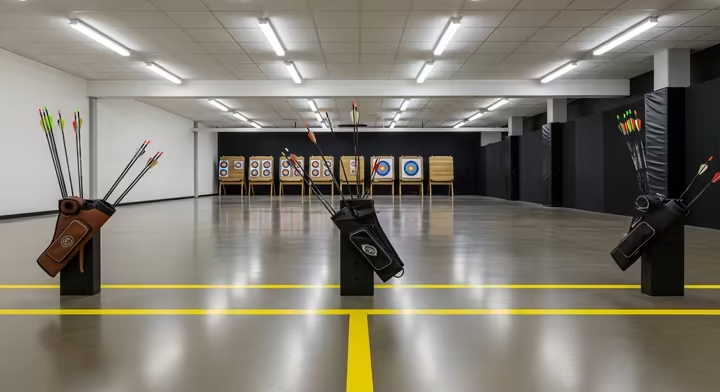
This whole process is usually run by whistle commands. It's a universal system, so you don't have to guess what "CLEAR!" means (Clear to shoot? Clear to go get arrows? Who knows!). Here’s the breakdown.
Two whistle blasts mean "archers to the line." Get your bow and walk up to the shooting line. Just stand there, don't nock an arrow yet. Patience, grasshopper.
One whistle blast means "begin shooting." Time to shoot! Nock your arrows and let 'em fly. If you drop an arrow and it rolls past the shooting line, just leave it there until it's time to get arrows.
Three whistle blasts mean "go get arrows." Shooting is over, so you can put your bow down and walk to the targets to retrieve your arrows. Walk, don't run.
Five or more whistle blasts mean EMERGENCY! Stop what you're doing immediately. Let your bow down safely (don't shoot!), put your arrow back in your quiver, and step away from the line.
A few other things, don't touch someone else's bow without asking, don't talk loudly while people are shooting, and don't "dry fire" your bow. Releasing the string without an arrow can make a bow explode. Really.
Target Archery: Scoring the Circles
Target archery is all about consistency. The goal is to put arrow after arrow in the same spot. That spot is usually on a big, colorful target.
The target has five colors. The center gold is worth 10 (the tiny inner circle) and 9 points. Then it goes red (8, 7), blue (6, 5), black (4, 3), and finally white (2, 1). An arrow that misses the whole thing is an 'M' for miss, worth a big fat zero.
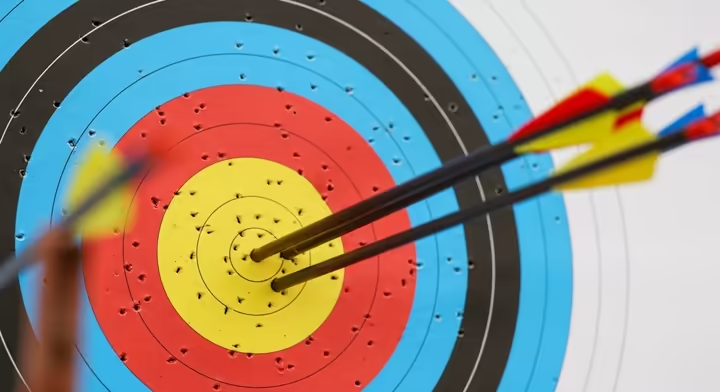
In a competition, you shoot in groups called an "end", usually three or six arrows. After everyone shoots their end, you all walk to the target to score. The most important rule is that NO ONE touches any arrows until every single one is scored and written down.
To score, one person calls out the arrow values from highest to lowest, like "Nine, nine, seven... five, five, M." If an arrow cuts the line between two scores, you get the higher value. (This is why some pros use fatter arrows, to catch more lines!).
The Big Leagues: World Archery Rules
Watching Olympic archery is seeing skill under pressure. It's governed by a group called World Archery (WA), and they have specific rules for different bow styles.
The Olympic Recurve Bow
This is the bow you see at the Olympics. Archers shoot at a target 70 meters away, aiming for a 10-ring the size of a CD. Rules allow a non-magnified bow sight for aiming and stabilizers , those long rods, to keep the bow steady. They also use a clicker , a little blade that 'clicks' when they reach the perfect draw length, ensuring every shot has the same power.
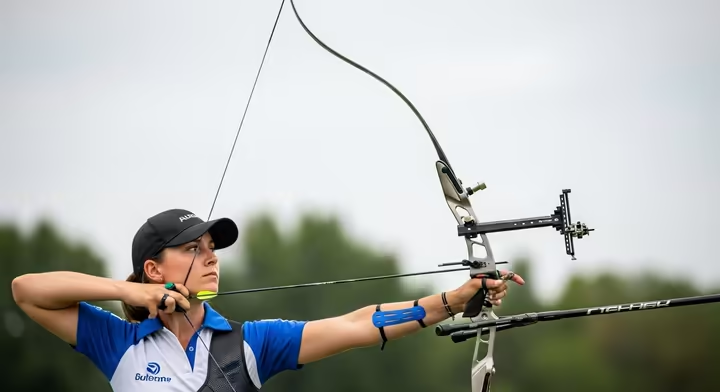
The matches are dramatic. They use a set system , a best-of-five contest where winning a three-arrow "set" gets you two points and a tie gets one. First to six set points wins. If it’s tied 5-5, it goes to a single-arrow shoot-off , and whoever's arrow is closest to the center wins.
The Compound Bow
Compound bows are the high-tech ones with cams and pulleys. These archers use magnified sights, a peep sight in the string, and a mechanical release aid to trigger the shot. Because they're so precise, they don't use the set system, they just add up the cumulative score over 15 arrows.

The Barebow
Barebow is pure skill- no sights, no clickers, no stabilizers. Archers aim by "string walking," which means holding the string at different spots to change the arrow's flight for different distances. It’s an amazing skill to watch, and like recurve, their matches use the tense set system.
Archery in Schools (NASP): The Great Equalizer
The National Archery in the Schools Program (NASP®) has a simple philosophy, everyone is on a level playing field. Its most important rule is that every student uses the exact same equipment. No exceptions.
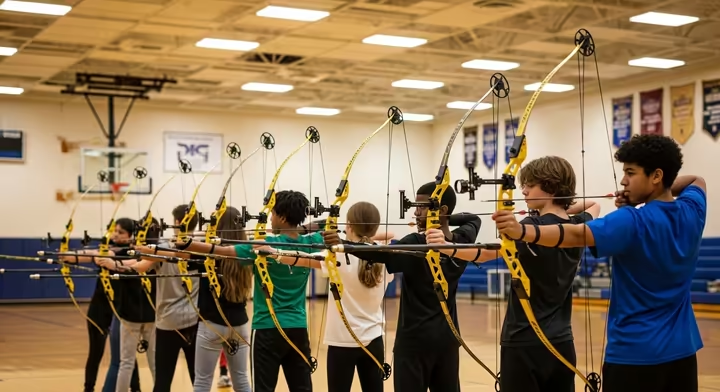
Everyone shoots an unmodified Mathews Genesis™ bow and the same Easton aluminum arrows. This means success comes from skill and focus, not from who has the fanciest gear. The program also has a major focus on safety, with its own whistle commands and a rule that quivers must be placed on the shooting line.
Even the team scoring is designed to be inclusive. A team's score is made from its top 12 archers, but at least four must be male and four must be female. This forces coaches to develop the whole team, not just a few stars.
Into the Woods: 3D Archery
3D archery swaps the flat range for a walk in the woods, with life-sized foam animal targets. It's designed to test bowhunting skills. The biggest rule is that the distances to the targets are unmarked.

Is that foam deer 27 yards away or 34? You have to judge for yourself. To add to the pressure, you only get one arrow per target. No second chances.
The two big organizations, ASA and IBO, have slightly different scoring, but the idea is the same, aim for the "vital" zone. The ASA has a high-risk, high-reward 12-ring you can call, while the IBO's center ring is worth 11 points. To keep it fair, there are different equipment classes and even maximum arrow speed limits.
Other Games: Field and Indoor Archery
Between the target range and the 3D course are a few other fun formats. Field and indoor archery both offer unique challenges.
Field Archery: A Bit of Everything
NFAA Field Archery is a mix of target and 3D. You shoot on a wooded course with uphill and downhill shots, but the distances are all marked. You shoot four arrows at each of the 28 targets.
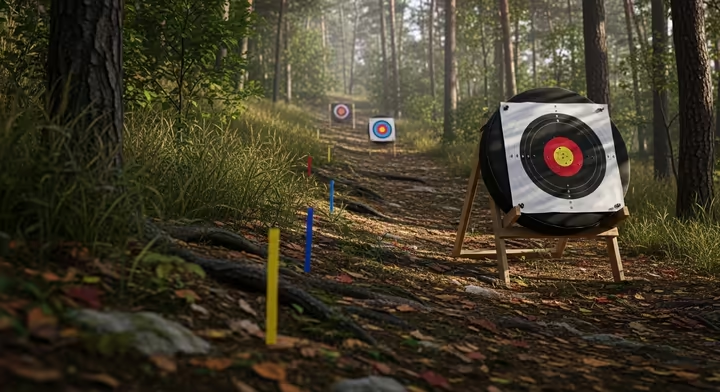
The fun part is the different shooting positions. "Walk-up" targets have you shoot one arrow from four different stakes, moving closer each time. "Fan" targets have you shoot from four stakes arranged in an arc. It's a great test of an archer's versatility.
Indoor Archery: Close-Quarters Precision
When it gets cold, everyone moves indoors. At close range (18 meters or 20 yards), archers are so accurate they might hit their own arrows. To prevent this, many events use multi-spot targets , where you shoot one arrow at each of three or five tiny bullseyes.
To make it harder, the scoring rules change. For compound archers, only the very tiny, innermost "X" ring counts as a 10. This is called "inner-ten scoring" and demands near-perfect precision.
The Hunter's Code: These Rules are Laws
When you enter the woods to hunt, the rules of the game become actual laws . This is the most important thing a bowhunter needs to understand. Breaking them can mean big fines, losing your gear, and losing your right to hunt.
These laws are set by state and provincial wildlife agencies to keep animal populations healthy. Before you hunt, you must have a valid hunting license and often a species-specific tag . These aren't just for revenue, they help manage the harvest.
Agencies also set specific seasons , bag limits (how many animals you can take), and legal shooting hours. There are also equipment laws, like minimum bow draw weights and rules about broadhead design, to ensure a humane harvest. Always read your local hunting regulation book every single year, because the laws change.
Beyond the law is the personal code of "Fair Chase." This ethical code means hunting in a way that doesn't give you an unfair advantage over the animal. It's about respecting the animal and the challenge of the hunt.
Conclusion: The Common Thread
From a school gym to the Olympic finals, archery is a huge and diverse sport. The rules might seem different, but they all share a common thread.
This thread is built on an absolute commitment to safety , the shared language of the range that keeps everyone safe. It's strengthened by respect for the gear, the competition, and the wild places we shoot. And it's finished with a spirit of honesty , whether you're scoring a target or making an ethical choice in the woods.
These principles are the real heart of archery. They're an invitation to join a global community. So find a range, ask questions, and with a spirit of safety and respect... let your first arrow fly.
Works cited
- Rules & Etiquette - Centenary Archers, https://www.centenaryarchers.org.au/about-us/rules-etiquette
- What is proper archery etiquette for an outdoor range? - Reddit, https://www.reddit.com/r/Archery/comments/c8csaq/what_is_proper_archery_etiquette_for_an_outdoor/
- Archery range rules | Oregon Department of Fish & Wildlife, https://myodfw.com/learn/tip/archery-range-rules
- Range Etiquette - Kennesaw Archery Club, https://www.kennesawarchery.org/learning/range-etiquette/
- What are the usual calls on a range (to signal arrow collecting and when the range is clear to shoot again) in English? : r/Archery - Reddit, https://www.reddit.com/r/Archery/comments/9dlc5q/what_are_the_usual_calls_on_a_range_to_signal/
- ww2.georgiasouthern.edu, https://ww2.georgiasouthern.edu/recreation/ssec/archery-center-rules/#:~:text=Whistle%20Commands,your%20arrows%20in%20your%20quiver.%E2%80%9D
- Shooting With a Whistle System - Greenhills Archers Club, https://www.greenhillsarchery.com/competitions/competition-rules-of-play/shooting-with-a-whistle-system/
- The Four Whistle Commands Used On A Range And Their Related Verbal Commands, https://www.scouterlife.com/blog//2014/12/the-four-whistle-commands-used-on-range.html
- Target archery, https://www.worldarchery.sport/sport/disciplines/target-archery
- Target archery - Wikipedia, https://en.wikipedia.org/wiki/Target_archery
- Scoring Guide - Woking Archery Club, https://www.wokingarchery.club/home/archers-resources/scoring-guide/
- Modern competitive archery - Wikipedia, https://en.wikipedia.org/wiki/Modern_competitive_archery
- Target Archery Indoor Rounds, https://nfaausa.com/news/target-archery-indoor-rounds
- Archery rulebook | Move United, https://moveunitedsport.org/app/uploads/2023/02/Move-United-2023-Archery-Rulebook.pdf
- ITAA Tournament Primer - Illinois Target Archery Association, http://illinoistargetarchery.org/itaa-tournament-primer/
- How to Score Indoor Archery: USA Archery, Vegas, Lancaster Classic and NFAA - YouTube, https://www.youtube.com/watch?v=NAlkiL1Cwz0
- Archery: From rules to Olympic records, all you need to know, https://www.olympics.com/en/news/archery-olympics-rules-disciplines-equipment-categories-bow-arrow
- Rulebook | World Archery, https://www.worldarchery.sport/rulebook/search/target%20face
- Chapter 11 - Athletes Equipment - Rulebook | World Archery, https://www.worldarchery.sport/rulebook/article/793
- Archery Rulebook 1 - Move United, https://moveunitedsport.org/app/uploads/2021/06/Move-United-2021-Archery-Rulebook-v.2.pdf
- Recurve - World Archery, https://www.worldarchery.sport/sport/equipment/recurve
- Chapter 14 - Scoring - Rulebook | World Archery, https://www.worldarchery.sport/rulebook/article/903
- Archery 101: Olympic competition format and scoring, https://www.nbcolympics.com/news/archery-101-olympic-competition-format-and-scoring
- Target size for compound archers - Sports Stack Exchange, https://sports.stackexchange.com/questions/17488/target-size-for-compound-archers
- Indoor archery, https://www.worldarchery.sport/sport/disciplines/indoor-archery
- Rulebook | World Archery, https://www.worldarchery.sport/rulebook/article/15
- Rulebook | World Archery, https://www.worldarchery.sport/rulebook/article/3138
- Barebow - World Archery, https://www.worldarchery.sport/sport/equipment/barebow
- 2022 NASP® National, Open & Championship Tournament Rules, https://www.naspschools.org/wp-content/uploads/Bullseye.pdf
- 2025 NASP® National & Championship Tournament Rules - South Carolina Department of Natural Resources, https://www.dnr.sc.gov/education/archery/pdf/NASPBullseyeRules.pdf
- NASP® Tournament Manual - KHSAA, https://khsaa.org/archery/nasp%20tournament%20manual%20updated.pdf
- Target scoring - Texas Archery Academy, https://texasarchery.info/target-scoring
- IBO RULES AND CLASS DEFINITIONS - International Bowhunting Organization, https://iboarchery.com/wp-content/uploads/IBO-Rules.pdf
- Rules – ASA Oklahoma, https://asaoklahoma.com/rules/
- Texas ASA Federation Rules | txasafederation, https://www.txasafederation.com/texas-asa-federation-rules
- ASA Rules - SD ASA Federation, https://www.sdasafederation.com/asa-rules
- IBO Traditional Rules - IBO TraditionalIBO Traditional, https://www.ibotraditional.net/about/rules/
- IBO Archery – International Bowhunters Organization - Shootingtime.com, https://shootingtime.com/archery/ibo-archery/
- Event Rules - USA Archery, https://www.usarchery.org/events/rules
- Field Archery – Description, Rules, Scoring, and More - Shootingtime.com, https://shootingtime.com/archery/field-archery-rules-scoring/
- Field Archery 101 - The Field Round - National Field Archery Association, https://nfaausa.com/news/field-archery-101-the-field-round
- HOW TO SHOOT FIELD ARCHERY FIELD ROUND HUNTER ROUND ANIMAL ROUND - Kings Mountain Archers, https://www.kingsmountainarchers.org/wp-content/uploads/how_to_shoot_field_archery_KMA.pdf
- NFAA Archery and Bowhunter Range Guidelines, https://www.dshs.texas.gov/sites/default/files/youthcamp/pdf/Archery-Range-Guidelines.pdf
- nfaa range Guidelines & round summaries, https://nfaausa.com/files/nfaa-range-guidelines-and-round-summaries-160223230435.pdf
- NFAA Shooting Styles & Equipment Rules, https://nfaausa.com/about/constitution/nfaa-shooting-styles-and-equipment-rules
- NFAA Equipment Class Descriptions - Minnesota Archers Alliance, https://www.themnaa.org/nfaa-equipment-classes
- 53rd USA Archery Indoor Nationals Format & Rules, https://www.usarchery.org/resources/2022-indoor-nationals-format-rules-221021141140.pdf
- 55th USA Archery Indoor Nationals Format & Rules, https://www.usarchery.org/resource/2024-indoor-nationals-format-and-rules
- Indoor National Tournaments - US Archery, https://www.usarchery.org/events/national-tournaments/indoor-nationals
- General Hunting Laws | U.S. Fish & Wildlife Service, https://www.fws.gov/law/general-hunting-laws
- 5 Legal Things to Know About Bow Hunting in the US - pissd.com, https://pissd.com/2024/01/5-legal-things-to-know-about-bow-hunting-in-the-us/
- The Laws Of Bow Hunting In The United States - Free Essay Example - Edubirdie, https://hub.edubirdie.com/examples/the-laws-of-bow-hunting-in-the-united-states/
- Hunting in Georgia | Department Of Natural Resources Division, https://georgiawildlife.com/hunting/hunter-resources
- Colorado Parks and Wildlife, https://cpw.state.co.us/
- Regulations - Gearhead Archery, https://www.gearheadarchery.com/regulations/
- Boone and Crockett Club's Fair Chase Statement | Boone and ..., https://www.boone-crockett.org/fair-chase-statement
- Fair chase - Wikipedia, https://en.wikipedia.org/wiki/Fair_chase
- Hunting Ethics — Texas Parks & Wildlife Department, https://tpwd.texas.gov/education/hunter-education/online-course/responsible-and-ethical-hunting/hunting-ethics
- Rules | World Archery, https://www.worldarchery.sport/rulebook
- Disciplines | World Archery, https://www.worldarchery.sport/sport/disciplines
- REFERENCE - USA Archery, https://www.usarchery.org/resources/event-reference-guidebook-080519202000.pdf
- Resource Center - USA Archery, https://www.usarchery.org/resource-center/news-downloads/all
- Constitution & By-Laws | National Field Archery Association USA, https://nfaausa.com/about/constitution
- FAQS - ASA Archery, https://asaarchery.com/faqs/
- Rules and Regulations - International Bowhunting Organization, https://iboarchery.com/rules-and-regulations
- Rules and regulations | World Archery, https://www.worldarchery.sport/tags/rules-and-regulations
- World-Archery-Rule-Book-ver.-2022-01-15-Change-Document-1.pdf, https://archerycanada.ca/wp-content/uploads/2019/06/World-Archery-Rule-Book-ver.-2022-01-15-Change-Document-1.pdf
- The Rules of Archery - EXPLAINED! - YouTube, https://www.youtube.com/watch?v=NjAlCCtZ3h0
- Judge Guidebook - World Archery Extranet, https://extranet.worldarchery.sport/documents/index.php/Judging/Manuals/JudgeGuidebook_ENG.pdf
- Competition Juries Policy USA Archery (USAA) has adopted the following rules, as written by World Archery as the worldwide gover, https://www.usarchery.org/resource/usa-archery-competition-juries-policy
- Chapter 19 - Appeals - Rulebook | World Archery, https://www.worldarchery.sport/rulebook/article/1062
- Shooting Handbook 2022 - National Field Archery Society, https://nfas.net/wp-content/uploads/2023/07/NFASRuleBook2022.pdf
- COMPETITIVE AGE CLASSES - USA Archery, https://www.usarchery.org/resource/age-classes
- Rulebook | World Archery, https://www.worldarchery.sport/rulebook/article/82
- Classification | World Archery, https://www.worldarchery.sport/sport/disciplines/para-archery/classification
- ASA Pro/Am Rules - 2025 - ASA Archery, https://asaarchery.com/rules/asa-pro-am-rules/
- General Rules - National Field Archery Association, https://nfaausa.com/about/constitution/general-rules-for-field-archery-games&term=field
- Event Rules | National Field Archery Association USA, https://nfaausa.com/events/rules
- General Hunting & Trapping Regulations - TN.gov, https://www.tn.gov/twra/guide/hunting-regulations.html
- USA Archery Equipment Class Descriptions - Minnesota Archers Alliance, https://www.themnaa.org/usa-archery-equipment-classes
- Rules | The Vegas Shoot, https://www.thevegasshoot.com/rules
- NBEF Bowhunter Laws and Regulations, https://www.bowhunter-ed.com/national/bowhunting_law/